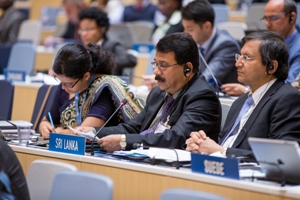
The Director General of the Geneva based World Intellectual Property Organization (WIPO) Dr. Francis Gurry, has assured support to the government's policy of orienting Sri Lanka towards a knowledge and innovation economy. Recalling his visit to Colombo in November 2013 when a 10 Point Action Plan was developed to strengthen IP related activity in the country and cooperation between Sri Lanka and the WIPO, Dr. Gurry commended the progress already made under this programme, and discussed modalities to further assist Sri Lanka.
Dr. Gurry made these observations when Secretary of the Ministry of Industry and Commerce Mr. S.S. Miyanawala met him on the sidelines of the 15th Session of the Committee on Development and Intellectual Property (CDIP) held 20-24 April 2015. Sri Lanka's Permanent Representative to the UN in Geneva Ambassador Ravinatha Aryasinha, Sri Lanka's Permanent Representative to the World Trade Organization Ambassador Nimal Karunatilake and Second Secretary Dilini Gunasekera were associated in the discussion.



Sri Lanka's Permanent Representative to the UN in Geneva Ambassador Ravinatha Aryasinha on 2 April 2015 addressed the first in the 'Ambassador’s Luncheon Series', on "The Role of Women in Peace-building: a Sri Lankan Perspective". The event which is a follow-up to the Geneva Peace Conference that was convened last year and focussed on Asian experiences of peace building, was co-organized by the Journalist and Writers Foundation (JWF), the Dialog Institute and Geneva Press Club. Mr. Subhas Gujadhur, Director of Universal Rights Group chaired the event.

Minister of Public Order, Disaster Management & Christian Affairs John Amaratunga led the Sri Lankan delegation to the Third UN Conference on Disaster Risk Reduction held 14 – 18 March 2015 in Sendai, Japan.
In his statement the Minister highlighting the common but differentiated principle at all levels of disaster risk reduction said Sri Lanka earnestly urges the international community to increase global cooperation and partnership with a view to transfer technological know-how, financial assistance and capacity building particularly for developing countries.


Minister of Foreign Affairs, Mangala Samaraweera addressing the High Level segment on the opening day of the 28th Session of the UN Human Rights Council, on 2nd March 2015 in Geneva briefed the Council on developments in Sri Lanka following the presidential election on 8th January and the new Government taking office. The Minister noted the Government was committed to engage and work in cooperation with a range of international organisations and countries and seek solutions to issues through dialogue, cooperation, understanding and learning.
- Sri Lanka calls for greater pace in the Working Group on Right to Development
- Ambassador Aryasinha calls on expatriate Sri Lankans and organizations to help in making the 'Declaration of Peace' pledge a reality abroad in practical ways
- Senior Advisor Jayantha Dhanapala meets with High Commissioner for Human Rights and Members of the Human Rights Council
